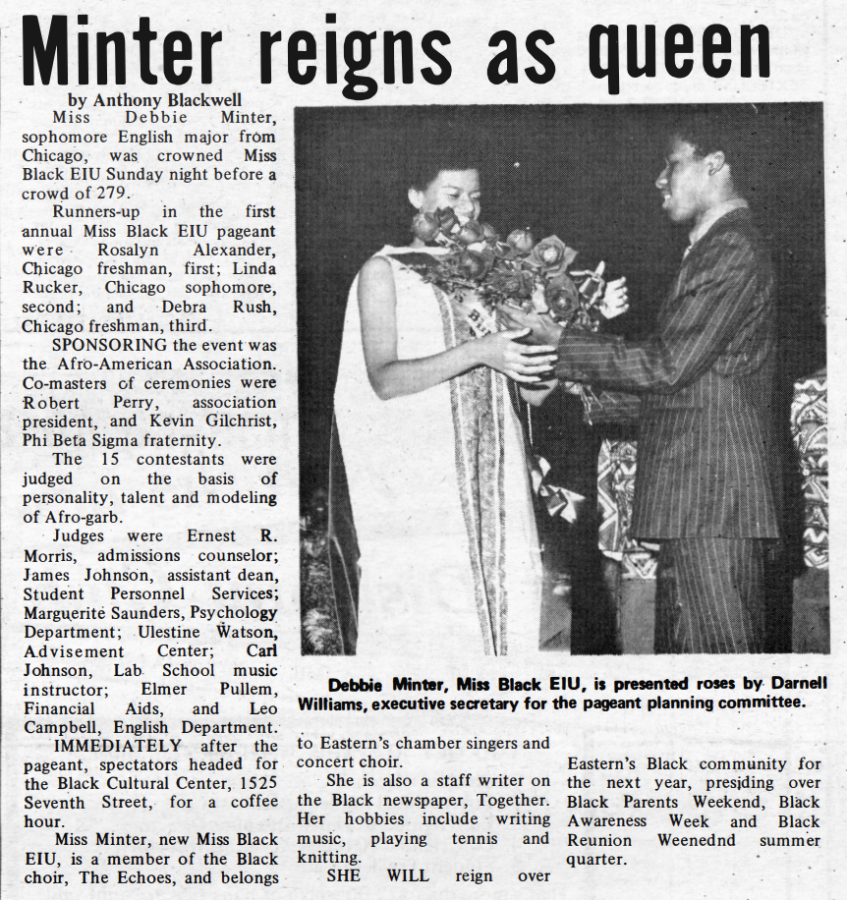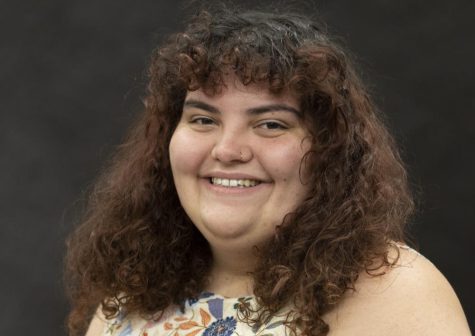First Miss Black EIU reflects on her legacy
March 22, 2022
More than fifty years ago, Debbie Minter Jackson left her mark at Eastern by being crowned the first Miss Black EIU.
A sophomore English major at the time, she said she was unaware of the long-lasting impact that first pageant would have on the Black community at Eastern; she just wanted to create a space for Black students.
“It was very nourishing and nurturing to have something that we could just say this was ours,” Minter Jackson said. “This is how we’re going to display our talent, what we’re about and make that happen.”
Like many recent Miss Black EIU contestants, Minter Jackson likened the scholarship pageant to a sisterhood.
“(It was a) foundation of women who, all together, realized the issue was not who was going to win, it wasn’t competitive, as much as ‘let us all hold hands and get out there and be together and show something,” Minter Jackson said. “There was a solidarity that I didn’t see other places.”
The pageant’s power went much further than creating a bond between contestants. It made a declaration: Black is beautiful.
“We were showing what we were about individually and in a solid unit,” Minter Jackson said.
She said her biggest statement was wearing her natural hair with pride.
“The whole hair thing was a major event. I could barely wear my natural (hair) when I was coming out of high school into college,” Minter Jackson said. “I had to make that as a statement to my family and friends, ‘This is who I am or what I’m about.’”
Looking back, she said she loves photos of herself, featuring an Afro, from the night she was crowned.
“I love the crown nestled on this Afro like, ‘wow, that was a statement,’” Minter Jackson said. “The look and the gowns, we were trying to be Afrocentric.”
In the time around when Minter Jackson attended Eastern, the campus and surrounding community made much progress in the emergence of space for the Black community, but it was met with resistance from some.
The Black student population was seeing unprecedented growth, creating a space for Black students to thrive.
Seven historically Black fraternities and sororities were chartered at Eastern during the late 1960s and early 1970s, the Black Student Union was founded in 1967 to promote unity among Black students and the Afro-American Studies program was founded in the fall of 1970.
At the same time, Black students protested for equal treatment by the university, a cross was burned on the lawn of the Black fraternity that sponsored the first Black woman to win a Homecoming Queen election at Eastern, Black residents’ homes were shot at and the sign of newly-named Martin Luther King Jr. University Union was defaced on multiple occasions.
In what Minter Jackson described as a “tumultuous” time, she said it was important to have examples of solidarity within the Black community at Eastern.
“We just kind of felt that there was going to be a tough road, no matter where we turned, and so we found real solace in having that support with each other in the 70s,” Minter Jackson said.
Now, fifty years after finding herself as the first-ever Miss Black EIU, Minter enjoys life in Washington D.C., writing for D.C. Metro Theatre Arts.
After graduating from Eastern she earned a Master’s degree from the University of Illinois at Urbana-Champaign and performed on stages across the Midwest and Washington, D.C. She has also found success as a writer, with her scripts being commissioned and produced by the old Source Theater and festivals in New York.
Whether it be on the stage performing, vying for Miss Black EIU or fighting against injustice, Minter Jackson paved the way for a variety of Black women at Eastern to thrive and continue creating spaces for Black students on campus.
Corryn Brock can be reached at 581-2812 or at [email protected].


















































